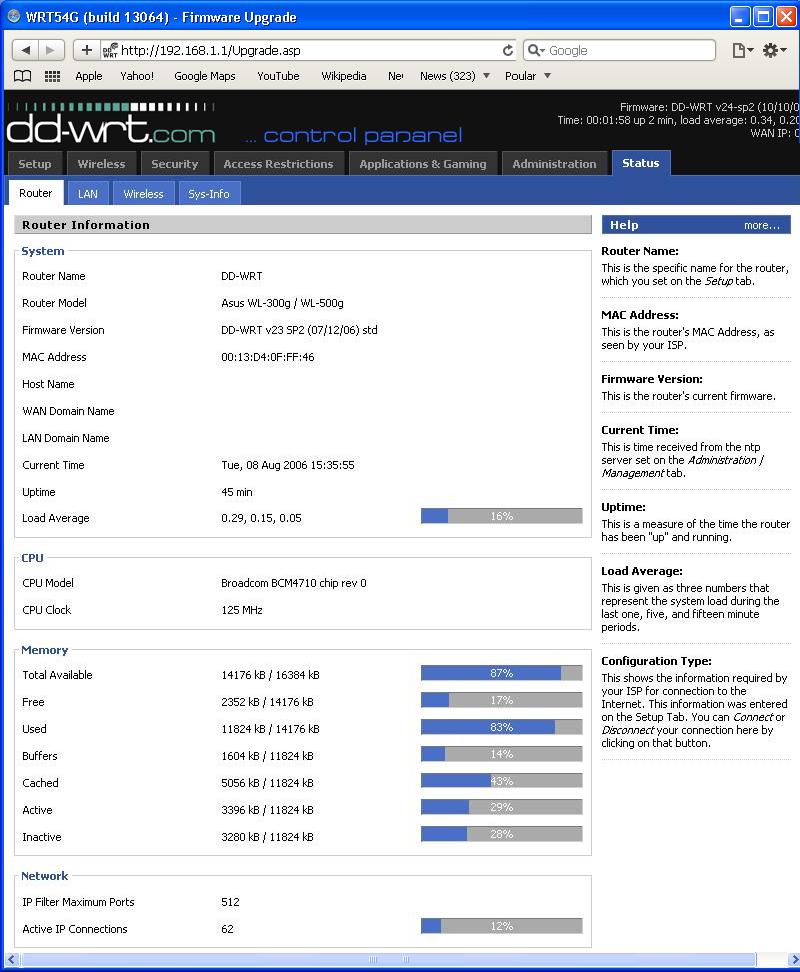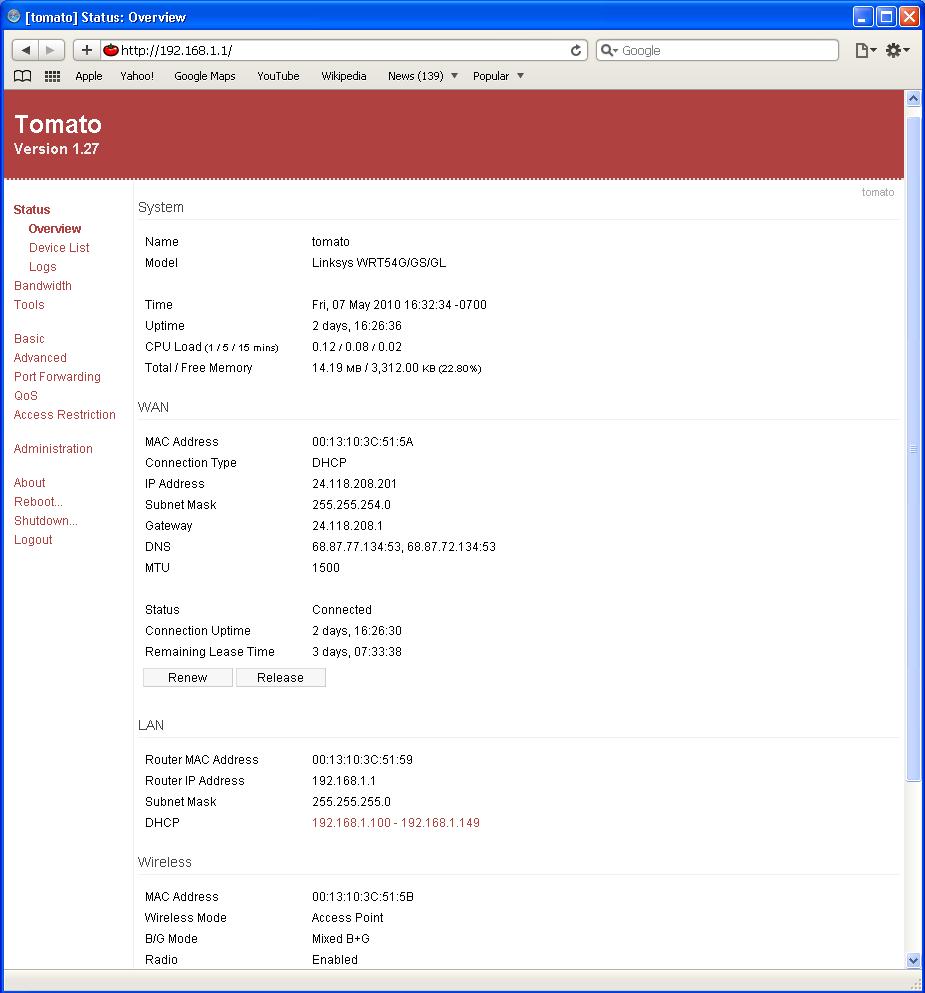Third Party Firmware: Difference between revisions
No edit summary |
No edit summary |
||
| Line 1: | Line 1: | ||
==Introduction== | ==Introduction== | ||
In this | In this article, you will be introduced to some of the third-party firewalls. Upgrading the firewall of your wireless router is one way to upgrade your wireless router because it will give you some rich feature. Below are some of the third party firewall features. | ||
* Stability under heavy load | * Stability under heavy load | ||
| Line 11: | Line 11: | ||
* Realtime bandwidth monitors | * Realtime bandwidth monitors | ||
* | * QoS | ||
* Create VLAN | * Create VLAN | ||
| Line 19: | Line 19: | ||
* Enhanced Security: WPA and WPA2, both versions for Enterprise, better customizable firewall, OpenVPN is enable, and so on. | * Enhanced Security: WPA and WPA2, both versions for Enterprise, better customizable firewall, OpenVPN is enable, and so on. | ||
You may want to upgrade your want to update the firewall of your wireless router if you want to integrate one or more of the following feature. The factory default firmware may not have these feature enable. | |||
===TOMATO=== | *Client mode or Client bridge mode | ||
*Repeater mode or Repeater bridge mode | |||
*WDM mode(Wireless Distribution System) | |||
*bandwidth monitoring | |||
*Virtual WLANs | |||
*Advanced QoS | |||
*IP and MAC filtering (including time and date) | |||
*Filtering by web site and keyword | |||
==Downloading and Installation== | |||
In this section, I will guide you to download, install and configure some of the most popular third-party firewalls. There are many third-party firewalls available today. Here is a list of the third-party firewall available for Wi-Fi routers. http://en.wikipedia.org/wiki/List_of_wireless_router_firmware_projects. The three most popular are DD-WRT, Tomato, and OpenWRT. DD-WRT and Tomato are the most two popular because they are easy to install and configure. | |||
DD-WRT web interface: | |||
[[File:ddwrt.jpg]] | |||
Tomato web interface: | |||
[[File:tomato.jpg]] | |||
===DD-WRT Installation=== | |||
DD-WRT is an alternate firmware available for many wireless routers. It is one of the most popular firewall. There is a paid and free versions available. DD-WRT is suitable for a great variety of WLAN routers and embedded systems. | |||
===TOMATO Installation=== | |||
Tomato is a free open source Linux-based firmware. The major emphasis of Tomato is on stability, speed and efficiency. Tomato includes several types of bandwidth usage charts, advanced QoS access restriction features, raised connection limits which enables P2P networking, and support for 125 High Speed Mode (marketed by Linksys as "SpeedBooster"). | Tomato is a free open source Linux-based firmware. The major emphasis of Tomato is on stability, speed and efficiency. Tomato includes several types of bandwidth usage charts, advanced QoS access restriction features, raised connection limits which enables P2P networking, and support for 125 High Speed Mode (marketed by Linksys as "SpeedBooster"). | ||
==Conclusion== | |||
Revision as of 01:39, 8 May 2010
Introduction
In this article, you will be introduced to some of the third-party firewalls. Upgrading the firewall of your wireless router is one way to upgrade your wireless router because it will give you some rich feature. Below are some of the third party firewall features.
- Stability under heavy load
- Strengthens the signal
- Setup a wireless client bridge and repeater bridge
- Realtime bandwidth monitors
- QoS
- Create VLAN
- Enable VPN Services
- Enhanced Security: WPA and WPA2, both versions for Enterprise, better customizable firewall, OpenVPN is enable, and so on.
You may want to upgrade your want to update the firewall of your wireless router if you want to integrate one or more of the following feature. The factory default firmware may not have these feature enable.
- Client mode or Client bridge mode
- Repeater mode or Repeater bridge mode
- WDM mode(Wireless Distribution System)
- bandwidth monitoring
- Virtual WLANs
- Advanced QoS
- IP and MAC filtering (including time and date)
- Filtering by web site and keyword
Downloading and Installation
In this section, I will guide you to download, install and configure some of the most popular third-party firewalls. There are many third-party firewalls available today. Here is a list of the third-party firewall available for Wi-Fi routers. http://en.wikipedia.org/wiki/List_of_wireless_router_firmware_projects. The three most popular are DD-WRT, Tomato, and OpenWRT. DD-WRT and Tomato are the most two popular because they are easy to install and configure.
DD-WRT web interface:
Tomato web interface:
DD-WRT Installation
DD-WRT is an alternate firmware available for many wireless routers. It is one of the most popular firewall. There is a paid and free versions available. DD-WRT is suitable for a great variety of WLAN routers and embedded systems.
TOMATO Installation
Tomato is a free open source Linux-based firmware. The major emphasis of Tomato is on stability, speed and efficiency. Tomato includes several types of bandwidth usage charts, advanced QoS access restriction features, raised connection limits which enables P2P networking, and support for 125 High Speed Mode (marketed by Linksys as "SpeedBooster").

